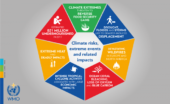Molly Minturn - My family is heartbroken to share that my father died in surgery on Monday, Feb. 10. It…
C02 emissions from shipping revealed
Written by Diana Thebaud Nicholson // February 12, 2008 // Aviation & Aerospace, Environment & Energy, Europe & EU, Health & Health care, Transportation // Comments Off on C02 emissions from shipping revealed
February 13, 2008
(The Guardian) Leaked UN report says pollution three times higher than previously thought
The true scale of climate change emissions from shipping is almost three times higher than previously believed, according to a leaked UN study seen by the Guardian.
It calculates that annual emissions from the world’s merchant fleet have already reached 1.12bn tonnes of CO², or nearly 4.5% of all global emissions of the main greenhouse gas.
The report suggests that shipping emissions – which are not taken into account by European targets for cutting global warming – will become one of the largest single sources of manmade CO² after cars, housing, agriculture and industry. By comparison, the aviation industry, which has been under heavy pressure to clean up, is responsible for about 650m tonnes of CO² emissions a year, just over half that from shipping.
Until now, the UN’s Intergovernmental Panel on Climate Change has estimated shipping emissions to be a maximum 400m tonnes, but the new draft report by a group of international scientists is a more sophisticated measure, using data collected from the oil and shipping industries for the International Maritime Organisation, the UN agency tasked with monitoring pollution from ships. It not only shows emissions are much worse than feared, but warns CO² emissions are set to rise by a further 30% by 2020.
Contacted about the contents of the report, Dr Rajendra Pachauri, chair of the IPCC, said: “This is a clear failure of the system. The shipping industry has so far escaped publicity. It has been left out of the climate change discussion. I hope [shipping emissions] will be included in the next UN agreement. It would be a cop-out if it was not. It tells me that we have been ineffective at tackling climate change so far.”
The figure is highly embarrassing for the four governments, including Britain, that paid for the report. Governments and the EU have consistently played down the climate impact of shipping, saying it is less than 2% of global emissions and failing to include shipping emissions in their national estimates for CO² emissions.
Pressure is now expected to increase on shipowners to switch to better fuels and on the EU to include shipping in its emission trading scheme. Last month aviation was provisionally included following intense pressure – but shipping escaped.
Previous attempts by the industry to calculate levels of carbon emissions were largely based on the quantity of low grade fuel bought by shipowners. The latest UN figures are considered more accurate because they are based on the known engine size of the world’s ships, as well as the time they spend at sea and the amount of low grade fuel sold to shipowners.
The UN report also reveals that other pollutants from shipping are rising even faster than CO² emissions. Sulphur and soot emissions, which give rise to lung cancers, acid rain and respiratory problems are expected to rise more than 30% over the next 12 years.
The health implications of shipping emissions are most acute for Britain and other countries bordering the English Channel, one of the world’s busiest shipping lanes. A recent peer-reviewed study of shipping emissions found world shipping led directly to 60,000 deaths a year.
Peter Smith, managing director of Intertanko, the grouping of the world’s largest tanker operators which provided data for the report, said the industry was taking steps to cut emissions. “World trade and ship numbers have seen a steady increase, but in parallel there have been economies of scale with larger, more efficient ships. Individual ships have steadily been reducing their fuel consumption for the last 20 years. One litre of fuel on a modern very large crude carrier moves one tonne of cargo more than 2,800km; this is more than twice as far as 20 years ago.”
A spokesman for the Department for Environment, Food and Rural Affairs said the government would support the development of a global emissions trading scheme through the IMO, and was also “investigating the feasibility of including maritime emissions” in the EU’s trading scheme. He said the shipping industry must take its “share of responsibility” for tackling climate change.



